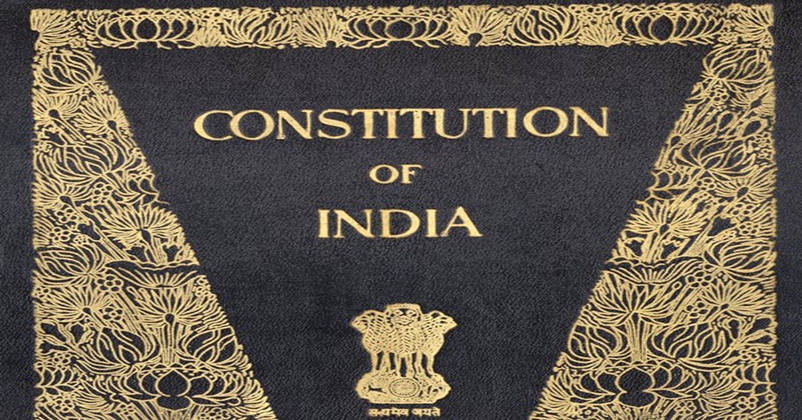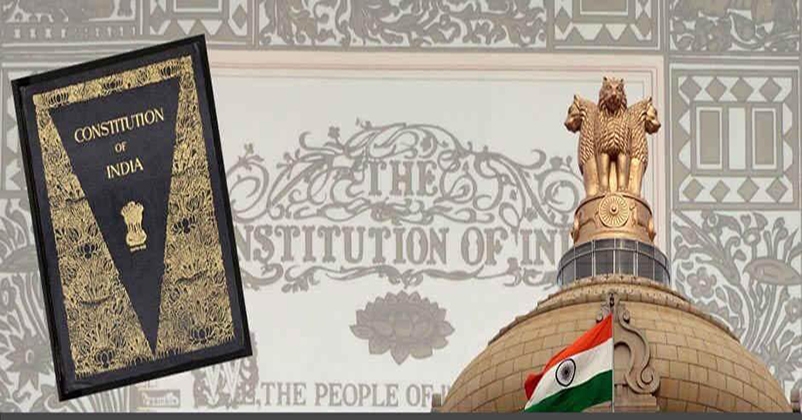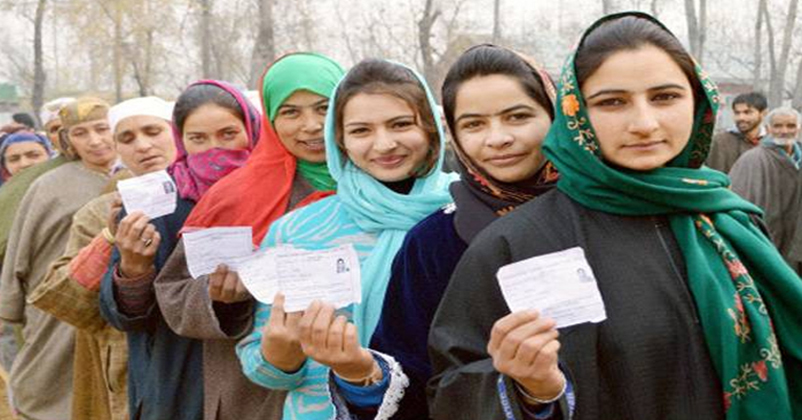Article 370(1-d) is surely not for amending the Constitution of India
| 25-Jan-2019 |

Art-35A was added in the Constitution of India as a ‘New” Article neither by the Constituent Assembly of India ( COI) nor by the Parliament of India (under the constituent powers available under Art368) but is taken to have been added simply by an order of the President of India ( C.O 48 of 14 May 1954) .This Article is neither part of Art35 nor does this article exit in the main body of the constitution of India before Art 36. The Constitution (Application to Jammu & Kashmir) Order, 1954 C.O. 48 is said to have been issued by President of India for adding Art 35A as a New Article in COI in exercise of the powers conferred on President by Clause (1) of Article 370 .
Article 35A has not been mentioned in the main text of the Constitution of India ( COI) but has been mentioned only in Appendix –I as one of the items of the Constitution (Application to Jammu and Kashmir) Order of the President of India of date 14 May 1954. But, the said order as far as items like Art 35A are concerned , is constitutionally invalid since Art 370(1) does not empower the President of India for amending COI so as to add a new Article like 35A since adding a new article is an act of amending of constitution and can not be taken refuge under even sub clause (d) of clause (1) of Article-370 of Constitution of India since the scope of this sub-clause ( 370-1d) is limited to only such of the other provisions of the Constitution of India that already exist in the Constitution of India where as vide constitution application order of 1954 C.O. 48 a new namely Article 35A is taken to have been added in constitution of India { Sub Clause (1d) of Art 370 (1-d) { Art370 (1) (d) ..such of the other provisions of the Constitution shall apply in relation to J&K State subject to such exceptions and modifications as the President may by order specify but… }
Although this aspect had not for about six decades attracted pointed / analytic/ critical attention of experts, but now since the possible constitutional inadequacies have been pointed out, adding a new article in the constitution can not be any more taken as simply nominating some exceptions and modifications w.r.t some provisions of the Constitution in relation to the Indian state of Jammu & Kashmir.
When we discuss The Constitution (Application to Jammu & Kashmir) Order, 1954 C.O. 48 with respect to adding Art35A in Constitution of India the question is not of modification of an existing constitutional provision but it is of adding a new article and that could be only by amending the constitution. In reference to the case under study it could be said that the President has not simply ordered application of some provisions of Constitution of India ( that existed in the first constitution of India or have been incorporated in constitution of India by Parliament at some later date after 26 Jan 1957 exercising the constituent power available under article 368) to Jammu & Kashmir with exceptions and modifications of but has in a way unconstitutionally overstretched his delegations so as to even amend the constitution of India.
In the PURANLAL LAKHANPAL Vs. THE PRESIDENT OF INDIA AND OTHERS case the apex court (Hon’ble Justice GAJENDRAGADKAR, P.B. SARKAR, A.K. WANCHOO, K.N., GUPTA, K.C. DAS, AYYANGAR, N. RAJAGOPALA Writ Petition No. 139 of 1957 under Art. 32 of the Constitution of India for enforcement of Fundamental rights. DATE OF JUDGMENT: 30/03/1961 ) held, that the word "modification" used in Art. 370(I) must be given the widest meaning in the context of the Constitution and in that sense it includes an amendment and it cannot be limited to such modifications as do not make any "radical transformation".

Where as in the case of Art35A the question is not of modification or amendment of an existing constitutional provision but it is surely of adding a new article amounting to unduly amending the constitution by the President ( not simply ordering some exceptions and modifications of some existing provisions of constitution of India for direct application with regard to Indian state of Jammu and Kashmir ).
Similarly in the Writ Petition No. 11 of 1968 under Art. 32 of the Constitution of India for the enforcement of the fundamental rights, Sampat Prakash vs State Of Jammu & Kashmir & Anr Bench BHARGAVA, VISHISHTHA HIDAYATULLAH, M. (CJ) SHELAT, J.M. MITTER, G.K. VAIDYIALINGAM in judgement delivered on 10 October, 1968 the Hon’ble SC had observed to go with the judgement delivered by a larger bench in the case Puranlal Lakhanpal v. The President of India, 1962.
So, <for this case also the apex court constitutional bench has observed as in the case of Puran Lal Lakshanpal the observations of the Apex Court -- “thus, in law, the word "modify" may just mean "vary", i.e., amend, and when Art. 370(1) says that the President may apply the provisions of the Constitution to the State of Jammu & Kashmir with such modifications as he may by order specify, it means that he may vary (i.e., amend) the provisions of the Constitution in its application to the State of Jammu & Kashmir.
We are, therefore, 'of opinion that in the context of the Constitution we must give the widest effect to the meaning of the word "modification" used in Art. 370(1) and in that sense it includes an amendment. There is no reason to limit the word "modifications" as used in Art. 370(1) only to such modifications as do not make any "radical transformation">. Since even if these judgements are kept in view , no doubt it is true that Art 370 (1-d) says that President may apply the provisions of the Constitution to the State of Jammu & Kashmir with such modifications as he may by order specify but that can be taken as making reference only to the provisions that existed in the constitution and can not be stretched to ‘amend’ (modifying) the Constitution itself i.e adding some new article in the Constitution of India as has been done by adding a new Article namely Art35A after Article 35 ( but so strangely not keeping it in the main body of the constitution, why ? is a fair question ) in constitution of India by the President by issuing the Constitution application ( to Jammu and Kashmir ) order of 1954 C.O. 48 .
Even with in the scope of sub- clause (d) of clause (1) of Article 370 an order for adding a new article in the constitution can not be defended or taken refuge under this provision which only allows modification of some existing constitutional provision and can not be used for amending the constitution of India to the extent of even adding a new article. So, an order, said to have been issued under Art 370(1) so as to add new article in COI does not fall in the class of modifying an existing provision as provided in Art 370 w.r.t the Indian state of J&K
No doubt addition to questions raised in foregoing para(s), the contents of Section-4(j) of the CONSTITUTION (APPLICATION TO JAMMU AND KASHMIR) ORDER, 1954 C.O. 48 are also being put under the question mark by some for being unconstitutional and void on the ground that the contents of Art35A damage the basic structure of the Constitution as regards the fundamental rights of some citizens of India and in a way go beyond even the jurisdiction that Parliament has under the constituent power contained in Art 368 for amending the COI.
Questions have not been raised earlier only in relation to the rights of Indian citizens of the non- Permanent Resident of J&K class but have also been raised on behalf of the rights of some of those indian citizens who have been categorised as ‘Permanent Resident of J&K’ having been continuously mal treated by the ‘local governments’ / legislature even when the deficiencies / wrongs that could be corrected locally had been submitted all these years to those in power/ local legislature. But although such bads / short coming as were pleaded by some before the Courts were in a way indirectly acknowledged as irregularities / discriminatory but simultaneously inability for granting any relief was expressed taking that as constitutionally protected under Art35A as has been said in the judgement of the case Bachan Lal Kalgotra vs State Of Jammu & Kashmir And Others { 20 February, 1987- Equivalent citations: 1987 AIR 1169, 1987 SCR (2) 369)}…. ( “It is to be noticed here that these provisions are not open to challenge as inconsistent with the rights guaranteed by Part III of the Constitution of India because of "the Constitution (Application to Jammu & Kashmir) Order, 1954" issued by the President of India under Art. 370(1)(d) of the Constitution by which Art. 35(A)was added to the Constitution in relation to the State of Jammu & Kashmir.” … “ In the circumstances, in view of the peculiar Constitutional position obtaining in the State of Jammu & Kashmir.
We do not see what possible relief we can give to the petitioner and those situate like him. All that we can say is that the position of the petitioner and those like him is anomalous and it is up to the Legislature of the State of Jammu Kashmir to take action to amend legislature, such as, the Jammu & Kashmir Representation of the People Act, the Land Alienation Act, the Village Panchayat Act, etc. so as to make persons like the petitioner who have migrated from West Pakistan in 1947 and who have settled down in the State of Jammu & Kashmir since then, eligible to be included in the electoral roll, to acquire land, to be elected to the Panchayat, etc. etc” … “In regard to providing employment opportunities under the State Government. it can be done by the Government by amending the Jammu & Kashmir Civil Services, Classification of Control and Appeal Rules. In regard to admission to higher technical educational institutions also, the Government may make these persons eligible by issuing appropriate executive directions without even having to introduce any legislation. The petitioners have a justifiable grievance.”..).
Hence here we are discussing & questioning only the technicalities / jurisdictions as regards the ‘birth’ of Art 35A and the authority delegated / powers conferred on the president under sub- clause 1-d of Art-370 of COI. So far Art35A,has been taken as valid and legitimate article of Constitution of India but it is now being put under question mark.
Article 35A that technically & legally does not qualify to be an Art of Constitution of India has already done enough damage &, promoted separatist ideologies so it must be declared a non existent Article of Constitution of India with out any delay. In other words need is not to abrogate it or to modify it or to amend it , need is to declare it a non existent article.
Let us now make the discussions more pointed and plead that the "first victim" of Art35A is even Constitution of India . More of the need is to take the Art35A out of political domain and limit discussions / analysis only with in legal domain ( as far as possible). Even with in the scope of sub- clause (d) of clause (1) of Article 370 an order for adding a new article in the constitution can not be defended or taken refuge under this provision which only allows modification of some existing constitutional provision and can not be used for amending the constitution of India to the extent of even adding a new article.
So, an order, said to have been issued under Art 370(1) so as to add new article in COI does not fall in the class of modifying an existing provision as provided in Art 370 w.r.t the Indian state of J&K
No doubt addition to questions raised in foregoing para(s), the contents of Section-4(j) of the CONSTITUTION (APPLICATION TO JAMMU AND KASHMIR) ORDER, 1954 C.O. 48 are also being put under the question mark by some for being unconstitutional and void on the ground that the contents of Art35A damage the basic structure of the Constitution as regards the fundamental rights of some citizens of India and in a way go beyond even the jurisdiction that Parliament has under the constituent power contained in Art 368 for amending the COI.

Questions have not been raised earlier only in relation to the rights of Indian citizens of the non- Permanent Resident of J&K class but have also been raised on behalf of the rights of some of those indian citizens who have been categorised as ‘Permanent Resident of J&K’ having been continuously mal treated by the ‘local governments’ / legislature even when the deficiencies / wrongs that could be corrected locally had been submitted all these years to those in power/ local legislature. But although such bads / short coming as were pleaded by some before the Courts were in a way indirectly acknowledged as irregularities / discriminatory but simultaneously inability for granting any relief was expressed taking that as constitutionally protected under Art35A as has been said in the judgement of the case Bachan Lal Kalgotra vs State Of Jammu & Kashmir And Others { 20 February, 1987- Equivalent citations: 1987 AIR 1169, 1987 SCR (2) 369)}…. ( “It is to be noticed here that these provisions are not open to challenge as inconsistent with the rights guaranteed by Part III of the Constitution of India because of "the Constitution (Application to Jammu & Kashmir) Order, 1954" issued by the President of India under Art. 370(1)(d) of the Constitution by which Art. 35(A)was added to the Constitution in relation to the State of Jammu & Kashmir.” …
“ In the circumstances, in view of the peculiar Constitutional position obtaining in the State of Jammu & Kashmir. We do not see what possible relief we can give to the petitioner and those situate like him. All that we can say is that the position of the petitioner and those like him is anomalous and it is up to the Legislature of the State of Jammu Kashmir to take action to amend legislature, such as, the Jammu & Kashmir Representation of the People Act, the Land Alienation Act, the Village Panchayat Act, etc. so as to make persons like the petitioner who have migrated from West Pakistan in 1947 and who have settled down in the State of Jammu & Kashmir since then, eligible to be included in the electoral roll, to acquire land, to be elected to the Panchayat, etc. etc” … “In regard to providing employment opportunities under the State Government. it can be done by the Government by amending the Jammu & Kashmir Civil Services, Classification of Control and Appeal Rules.
In regard to admission to higher technical educational institutions also, the Government may make these persons eligible by issuing appropriate executive directions without even having to introduce any legislation. The petitioners have a justifiable grievance.”..).
Hence here we are discussing & questioning only the technicalities / jurisdictions as regards the ‘birth’ of Art 35A and the authority delegated / powers conferred on the president under sub- clause 1-d of Art-370 of COI. So far Art35A,has been taken as valid and legitimate article of Constitution of India but it is now being put under question mark.
Article 35A that technically & legally does not qualify to be an Art of Constitution of India has already done enough damage &, promoted separatist ideologies so it must be declared a non existent Article of Constitution of India with out any delay. In other words need is not to abrogate it or to modify it or to amend it, need is to declare it a non existent article.
Let us now make the discussions more pointed and plead that the "first victim" of Art35A is even Constitution of India . More of the need is to take the Art35A out of political domain and limit discussions / analysis only with in legal domain ( as far as possible)
